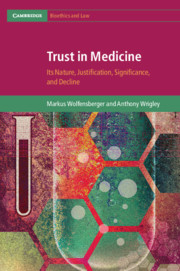Book contents
- Trust in Medicine
- Cambridge Bioethics and Law
- Trust in Medicine
- Copyright page
- Dedication
- Contents
- Figures
- Tables
- Preface
- Acknowledgements
- A Note on Usage
- Part I Introduction
- Part II The Nature of Trust
- 3 A Critical Analysis of Existing Definitions of Trust in Medicine
- 4 Proposing a New Type of Definition
- 5 A Pattern-Based Definition of Trust
- 6 Differentiating Trust from Related Concepts
- 7 Adapting the Definition of Trust to Different Situations
- Part III Justification of Trust
- Part IV Significance of Trust
- Part V The Decline of Trust
- Part VI Perspectives
- References
- Index
- Series page
7 - Adapting the Definition of Trust to Different Situations
from Part II - The Nature of Trust
Published online by Cambridge University Press: 19 August 2019
- Trust in Medicine
- Cambridge Bioethics and Law
- Trust in Medicine
- Copyright page
- Dedication
- Contents
- Figures
- Tables
- Preface
- Acknowledgements
- A Note on Usage
- Part I Introduction
- Part II The Nature of Trust
- 3 A Critical Analysis of Existing Definitions of Trust in Medicine
- 4 Proposing a New Type of Definition
- 5 A Pattern-Based Definition of Trust
- 6 Differentiating Trust from Related Concepts
- 7 Adapting the Definition of Trust to Different Situations
- Part III Justification of Trust
- Part IV Significance of Trust
- Part V The Decline of Trust
- Part VI Perspectives
- References
- Index
- Series page
Summary
So far, the authors have presented a maximally comprehensive definition of ‘trust’, i.e. a definition based on the full pattern. Such a definition is very narrow and arguably of limited use in everyday practice. However, through the pattern-based approach we are at liberty to use a less selective definition that covers only a number of the features of the pattern of trust depending on the situation. Thereby, one obtains a spectrum of definitions of ‘trust’, ranging from the basic definition based on the lowest common denominator of ‘trust’, ‘confidence’, and ‘reliance’, to the maximally comprehensive (i.e. very narrow) definition of ‘trust’. Whereas pattern-based definitions may not offer unequivocal definitions as necessary conditions-based definitions do, in compensation, they are much more flexible and can be adapted to different situations and different needs.
- Type
- Chapter
- Information
- Trust in MedicineIts Nature, Justification, Significance, and Decline, pp. 89 - 94Publisher: Cambridge University PressPrint publication year: 2019

